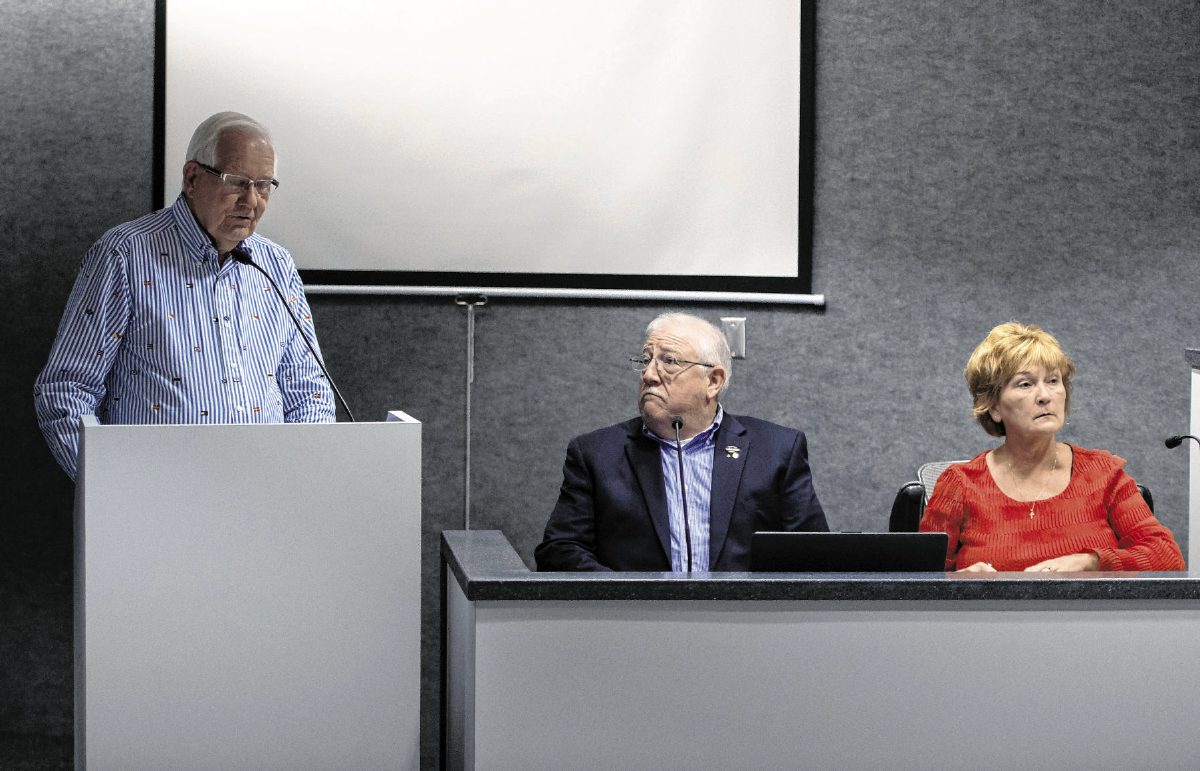When you head to a vote center in 2020 to make your choice for president, you’ll cast a ballot on new voting equipment.
And your vote will leave a paper trail.
After years of debate, the county will purchase all new voting equipment ahead of the presidential election.
[sc:text-divider text-divider-title=”Story continues below gallery” ]Click here to purchase photos from this gallery
The Johnson County Board of Commissioners on Monday unanimously approved buying all new equipment from its current, temporary vendor, MicroVote, the Indianapolis-based company that saved the county in the wake of its Election Day fiasco last November by renting to officials enough equipment to get voters through this year’s municipal elections.
The county will spend about $1.5 million on services and equipment, including 320 voting machines. The Infinity Voting Machine with VVPAT — Voter Verifiable Paper Audit Trail — is the newest system MicroVote has to offer, and was certified by the state in July. The contract between the county and the company will be for four years.
The company had the lowest bid, said Phil Barrow, election board member, but other factors sealed the deal.
Clerk Trena McLaughlin chose MicroVote due to the ease and size of its machines, its support staff, the county’s experience with the vendor during the May primary election and the fact that the cost is a packaged deal with no add-ins, she said last week.
“We have a lot of confidence in MicroVote. They did a tremendous job for us in the spring, and the voters were absolutely ecstatic. I don’t think any of us got one negative comment,” Barrow told the commissioners.
The equipment the county will buy from MicroVote is similar to what it is using this year, except newer, and it includes a Voter Verifiable Paper Audit Trail. The new system will cost about $1,000 more per machine than the cost that was included in the vendor’s initial bid.
The current system allows poll workers and election officials to view a printable audit of each ballot cast, whereas the new system will allow the voter to see that audit as well.
Through a state-funded program, the county will likely get reimbursed for the cost of 45 — or 10 percent — of the new machines. The state has already purchased 1,000, including with the paper audit trail, and plans to distribute those to counties that currently use MicroVote, including Johnson County, Miller said.
MicroVote serves 52 of Indiana’s 92 counties, more than any other election vendor in the state.
The company also agreed earlier this year to give the county a $62,500 credit if election officials decided to buy all new equipment from the vendor before 2020.
The county fired its previous vendor in February after an investigation by the Secretary of State’s Office revealed ES and S broke or attempted to break state election laws in configuring a workaround to get voters through polling places. The county is renting equipment from MicroVote for this year’s municipal elections, but local election officials want to buy all new equipment before next year’s election, which is expected to produce a massive turnout.
ES and S attempted to get the job from the county this time, and did have impressive new equipment, board members agreed, but ES and S bid the highest despite the company’s history with the county.
Earlier this month, the Johnson County Council unanimously approved borrowing $1.4 million to spend on new equipment. The council will need to vote on borrowing the money again at its next meeting Oct. 7, and that money will be available Dec. 18.
For years, the county put off buying new voting equipment due to the cost, despite several urges from election officials to find the money and make the move. That left the county’s previous election equipment old and outdated.
MicroVote will also dispose of all of ES and S’s old equipment, including 481 iVoltronic voting machines, some of which no longer work, and 90 e-poll books that were not re-certified by the state after the November election, McLaughlin said.
The 2020 presidential primary is less than eight months away. McLaughlin and the board did not relent in the county’s need for new equipment after a technical failure last November left some voters waiting in lines for hours, and others not voting at all. The county’s old equipment would not be able to handle the turnout at a presidential election.
“Thank you for your efforts on this. I know it’s been a hard task up to this point,” Commissioner Ron West said.
“I know you came into a hornet’s nest, Trena, but I’ve been really, really proud of the way our clerks have handled this,” Baird said. “It’s really great to see people doing the right thing the right way.”





